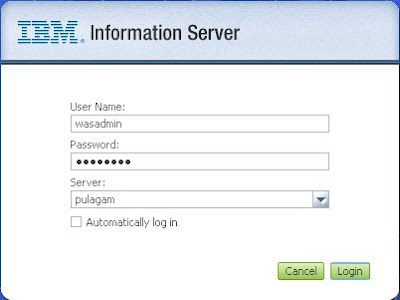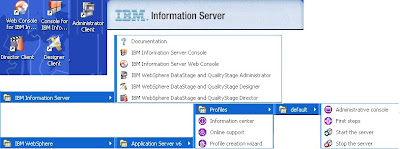




The guide below shows a step-by-step instructions on how to install IBM Information Server 8.1 (with Infosphere Datastage and Qualitystage and Information Analyzer) on a Windows 2003 Server machine. Read the installation steps for Red Hat Enterprise Linux above first as most of the tips apply for the installation of IBM IS 8.1.
Install and configure an Oracle database. Oracle 10g was used in this guide.
Create a dedicated oracle user, owner of a schema for the datastage repository, by running the following script from the installation media: (We used xmeta user).
...\is-ia-suite\DatabaseSupport\Windows\MetadataRepository\Oracle10g\create_xmeta_db.cmd
- Usage: create_xmeta_db OracleSystemUser OracleSystemPassword ServiceName XmetaUserName XmetaUserPassword XmetaTableSpaceName XmetaDatafilePath
- Example: create_xmeta_db SYSTEM ETLTOOLSINFO ORCL xmeta xmeta xmetaspace C:\oracle\product\10.2.0\oradata\orcl
If Information Analyzer will be used, a similiar script needs to be run to configure the database: ...\is-ia-suite\DatabaseSupport\Windows\InformationAnalyzer\Oracle10g\create_ia_db.cmd
- Usage: create_ia_db OracleSystemUser OracleSystemPassword ServiceName IAUserName IAUserPassword IATableSpaceName IADatafilePath
- Example: create_ia_db SYSTEM ETLTOOLSINFO ORCL ia ia iaspace C:\oracle\product\10.2.0\oradata\orcl
Run the IBM Infosphere installer - install.exe
It is a good practice to disable the windows firewall for the Datastage installation. It can be re-enabled after a successful installation.
Choose the default directory. By default it is C:\IBM\InformationServer.
Select the Information Server applications (tiers) for the installation. The choices are the following:
- Client applications - Datastage and QualityStage Designer, Datastage and QualityStage Director, Datastage and QualityStage Administrator
- Engine - Datastage and QualityStage runtime components. One engine can be installed on a Microsoft Windows Server system
- Services - common agents and services which run in the WebSphere application server
- Metadata repository - it stores all the Information Server metadata. The repository will use the Oracle database specified earlier. Otherwise the installer will install a DB2 database on the system. Uncheck this option if you want to use Oracle or any other than DB2 database for the repository
- Documentation - a bundle of PDF documents about Information Server
Point to the Information Server license file (an xml file stored on a local disk)
Select products and components to include in the installation. The available products are:
- Business Glossary (a web based tool to author and manage business metadata)
- DataStage and QualityStage (ETL, Data Integration and Data Quality Management tools)
- Documentation
- Information Server FastTrack (spreadsheet-like interface to capture source to target mappings)
- Information Analyzer (data profiling tool which help understand source data)
- Information Services Director (publisher information access and helps implement SOA)
- Information Server Manager (enhances the Datastage import and export utilities)
- Metadata Workbench (provides a web-based console for exploration of Information Server's metadata)
- Metadata repository (DB2 database which hosts the metadata repository; not used in this tutorial)
- Metadata server (metadata management processes)
Choose typical or custom installation. We recommend choosing the second option to have better control and understanding of the installation process.
Provide details for the oracle metadata repository connection
If available, configure an existing instance of a Websphere Application Server. Otherwise a new instance will be installed.
Specify user credentials for a Websphere administrator
Specify user credentials for Information Server administrator (isadmin in this tutorial)
Create a new Datastage project (etltoolsinfo datastage project was used in this tutorial)
Specify database logon information for the Information Analyzer user (ia in our tutorial)
Configure an agent, Job Monitor, Resource tracker. We don't recommend making any changes here
NLS support. Needs to be selected if non-english data will be used in the data integration processes.
Choose to install a MQ plugin if required. This is for backward compatibility; for new jobs, a Websphere MQ Connector can be used.
Review the installation summary and run the installation process. You can have a cup of coffee or a lunch break as this may take even a few hours for the installation process to complete.
Restart the server
Go to the Information Server Web console, log on with the IS Administrator credentials, go to Administration -> Domain management -> Datastage credentials. Specify the Default Datastage and QualityStage credentials and provide a system-os datastage user (dsadm by default).
Run an Administrator client and try to log on to a newly created projects.



2 comments:
hi dude your data is superb but my net too slow can you send to my mail when you post please........
my mail is: annabathunisubash@gmail.com
please dude......
hi,
i'm trying to install this on a Win7 64 bit machine, but when i reach d part for selecting options the Engine, Services and Metadata Repository are all disabled. Can idea on what may be causing this and how i should resolve it...
Post a Comment